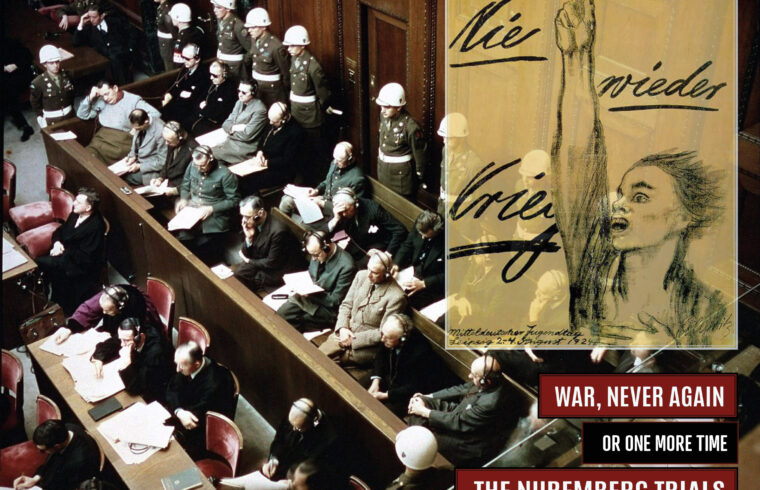Prof. Dr. Armin Bernhard
GERMANY
Wolfgang Borchert would be stunned if he heard one day that a Social Democrat defense minister was calling for Germany to develop its capabilities for war. Just after World War II, the experiences of the war had already permeated into the author’s flesh and blood. The disgust and horror of war penetrate the thoughts of the seriously ill writer, and all these thoughts are recorded in writing: His drama „Outside, in front of the door,“ his poems and aphorisms, his „manifesto“ of the 1940s – these works, often counted with contempt in the literature of rubble, contain not only a bitter outcry against war as a crime against humanity, but also an unequivocal call to prevent and overcome all attitudes that make wars possible.
„Take off your helmet, take off your helmet,“ says Borchert in „Our Manifesto,“ „We have lost! […] We will never again be ready with just a whistle and shout „Yes, sir“. We’ll cry, shit and sing whenever we want to […] And no general will ever call us as You before the battle. Before that terrible battle. We will never again have sand between our teeth out of fear (not the sand of the steppe, not the sand of Ukraine, not the sand of Cyrenaica or Normandy – not the bitter and evil sand of our own homeland!) And there will never again be that warm, wondering feeling in the brain and gut before battle”1
The contradiction between Borchert’s statement and the German Defense Minister’s declaration, which fell far short of the author’s vision, could not have been sharper. “We have to increase our belligerence. We have to improve our defense. And to do this we have to organize the federal army and society“, these were the words pronounced by the minister in October 20232 apparently unafunaffected by fascism and the atrocities of the war. In fact, Defense Minister Pistorius succeeded in drawing public attention to what Federal Army Chief Inspector Carsten Breuer, who was responsible for the 2016 Federal Army White Book, had called for in July 2023: Increase in belligerence3.July 2023: Increase in belligerence3. In December 2023, the Chief Inspector becomes more explicit. We are being told from the outside when to increase our belligerence. And to me that means: We have to increase our belligerence as soon as possible”4. The General contemplates armament for this purpose, as well as the first carrier column: The change in the mentality of society, which is endlessly cited, and the „combat readiness of personnel“. The overall goal is to strengthen the resilience of society as a whole, which is already at the heart of the 2016 White Book’s security policy strategy. To further enlighten us, the Foreign Policy Society defines resilience as „the preparedness and capacity of a society to withstand the constraints and losses of conflict.“ Social resilience -mental and physical- is essential to maintain morality and coexistence.. This covers securing infrastructures (transport, energy, digital environment, healthcare), but also the public manifestation of faith in the sense and the ability to deal with conflicts”5. Such militaristic statements are part of a series of statements aimed at the strategic goal of definitively destroying the culture of military restraint that Germany rightly developed after World War II. There is discussion about the exhaustion of the benefits of peace, about the need for Germany to leave the comfort zone of peace and increase its defense capability. The military and society must be more resilient to cope with the „modern“ management of war. The „absence of hostility“ (Gauck) between nations is also seen as highly problematic, because it is supposedly based on false trust-building measures, while general distrust and suspicion are the order of the day.
There is a history policy that has accompanied these militaristic statements for years, a policy that takes the lessons of the two world wars and fascism and turns them upside down. The culture of military moderation is replaced by a defensive mentality that finds its ideological justification in the German past. After all, from the crimes committed by fascism „can not be obtained the right for Germans to close their eyes“, says historian Heinrich August Winkler 8. 5. 2015 in the Federal Parliament6, on the 70th anniversary of the end of World War II; no, Germany’s Nazi past brings germans the moral responsibility to send its army around the world in virtuous wars, justified on humanitarian grounds. Everything that could block public opinion on the need for military engagement must be eliminated. The war fought by the Federal Republic of Germany against Yugoslavia represented the original historical sin after the fascist experience and the Second World War, but it was only a step on the way to the establishment of a public consensus on the militarization of the country. Therefore, the Potsdam Treaty of 1945 rightly foresaw the systematic demilitarization of Germany – it not only banned the establishment of an army, but also the creation of its own armaments industry. The society known as post-heroic7 society, which is the nightmare of the policy of militarization, armament and deterrence, is under continuous ideological fire. Former President Gauck, in his speech at the Federal Army Staff Academy in 2012, soundly condemned the happiness-addicted society8 which, with its hedonistic thoughtlessness and indifference, suppresses the fact that it owes its existence to the selfless actions of soldiers, „brave citizens in uniform“ who, – all over the world – risk their lives in defense of our freedom. In the opinion of Gauck, these are traitors who stab Germany in the back, but this time they do it in a different way, by preventing Germany from pursuing its legitimate peaceful ambitions, which is to say, by preventing it from confronting human rights violations around the world with military means. According to Gauck, these are people who have not yet understood the challenges of the new times and who abuse „Germany’s historical guilt“ to „hide their detachment from the world or their self-complacency.“ Gauck did not by coincidence stated these fundamental sentences at the Munich Security Conference 2014 under the title „Germany’s Role in the World“9. Germany’s new definition of its global political role has used a term often abused and devalued in political jargon: The word responsibility with a positive meaning. Germany finally assumes its responsibility and fulfills its obligations to meet future military challenges. The desire to attribute a positive meaning to wars, associated with the word „taking responsibility“, not only mitigates the contamination of the war phenomenon, but also accuses of irresponsibility those who oppose military „engagement“ for the deterrence policy and peace. By referring to history, anti-militarism, anti-war attitudes and the struggle for peace are branded as irresponsible. People who support trust-building measures and oppose the delivery of arms to Ukraine belong to the genre of the pacifist lumpens, traitors10, conspiracy theorists and admirers of Putin.
Based on this logic, the increase in belligerence and the change in mentality represent, at the turning point, the definitive break with the culture of military moderation. The aim is to achieve a systematic backlash against anti-military thinking and anti-armament policy. It is about going hand in hand with this objective of reinforcing positions that increase the resilience of society in the face of the obligations and burdens that will derive from the new political strategies of „security“. The recent statement by war veteran Joseph Fischer that the „basic pacifist attitude“ which is „spreading“ in Germany is detrimental to peace and must therefore be replaced by a different attitude characterized by mistrust is in line with the desired change in mentality11.
In the pacifist movement and in the pursuit of peace, not being prepared for war must be opposed to that of war-making; since the increase of belligerence and of the social resilience that sustains it cannot mean anything other than being belligerent. It should be obvious, especially to the Germans, that increased belligerence would lead to a historical gap at all levels. And if in Germany it is possible to speak again not only of fighting, but also of victory, if it is intended to destroy the economies of foreign countries and if the word victory and the will to win (Breuer) celebrate its rebirth, then the alarm bells must begin to ring loudly in everyone’s ears.
In the face of easily audible war calls and massive rearmament initiatives, the time to combat the escalation of belligerence definitely arrived some time ago. What Borchert suggests as an unconditional principle is to reject all forms of deterrence, armament and hostility, to say no with determination. Especially in times like these, not being prepared for war becomes a fundamental virtue. Not being prepared for war is necessary to make civilization possible. Only those who are inept at war can be prepared for peace. Not being prepared for war not only implies deterrence and the absence of attitudes favorable to the violent resolution of conflicts. The ineptitude for war involves a constant mental, spiritual and psychological disarmament, the creation of a capacity of resistance that „immunizes“ people against the patterns of justification of non-peace and armamentism. Not being prepared for war is not merely a passive trait, but an active mental activity that seeks to trace the interests behind the calls for a change in the civil-military mentality and for greater combativity. Not being prepared for war means making an effort to set aside narratives that seek to integrate people into fantasies of deterrence and armament. Not being prepared for war means resisting the images of the enemy that have been installed in the hearts and minds of the people and that politics exploits to impose its interests. Not being prepared for war also means resisting the militarization of words and concepts that have already penetrated everyday life and language. The development of belligerence – this is actually the worst word of the year 2023. It is so far from a civilized world that it is almost disgusting.
Sources:
Borchert, Wolfgang (1979): Das Gesamtwerk. Reinbek: Rowohlt
Fischer, Joseph (2024): Wir können nicht nur auf das Gute im Menschen vertrauen…“. https://www. augsburger-allgemeine.de/politik/interviewjoschka- fischer-wir-koennen-nicht-einfach-nurauf- das-gute-im-menschen-vertrauen-id69118266. html; Zugriff: 18. 1. 2024)
Gauck, Joachim (2012): Antrittsrede bei der Bundeswehr (https://www.bundespraesident. de/SharedDocs/Reden/DE/Joachim-Gauck/ Reden/2012/06/120612-Bundeswehr.html; Zugriff: 16. 1. 2024)
Gauck, Joachim (2014): Deutschlands Verantwortung in der Welt (https://www. bundespraesident.de/SharedDocs/Reden/ DE/Joachim-Gauck/Reden/2014/01/140131- Muenchner-Sicherheitskonferenz.html; Zugriff: 16. 1. 2024)
Mölling, Christian/Torben Schütz (2023): Den nächsten Krieg verhindern. In: GFAP Policy Brief. Heft 32, S. 1-10 (https://dgap.org/system/files/ article_pdfs/DGAP%20Policy%20Brief%20Nr-32_ November-2023_11S_1.pdf; Zugriff: 16. 1. 2024) Münkler, Heribert (2007): Heroische und postheroische Gesellschaften. In: Merkur. Nr. 700. 2007 (https://www.merkur-zeitschrift.de/ herfried-muenkler-heroische-und-postheroischegesellschaften/; Zugriff, 16. 1. 2024) Nachgefragt (2023): “Wir müssen so schnell wie möglich kriegstüchtig werden.“ (https:// www.bundeswehr.de/de/aktuelles/meldungen/ generalinspekteur-zur-kriegstuechtigkeitbundeswehr- 5718502; Zugriff: 16. 1. 2024)
Ntv 2023: Mentalitätswandel nötig. Oberster Soldat: Bundeswehr muss wieder kriegstüchtig werden. (https://www.n-tv.de/politik/Oberster- Soldat-Bundeswehr-muss-wieder-kriegstuechtigwerden- article24260720.html; Zugriff: 16. 1. 2024)
Pistorius, Boris (2023): Wir müssen kriegstüchtig werden. (https://www.zeit.de/politik/deutschland/2023-10/pistorius-modernisierungbundeswehr- kriegsgefahr-europa; Zugriff: 20. 1. 2024)
Winkler, Heinrich August (2015) Rede vor dem Bundestag am 8. 5. 2015 (https://www. bundestag.de/webarchiv/textarchiv/2015/ kw19_gedenkstunde_wkii_rede_winkler-373858; Zugriff: 16. 1. 2024)
* This article is published simultaneously in PoliTeknik Turkish edition, PoliTeknik International and PoliTeknik Español.
- Borchert 1979, S. 308 f.
- Pistorius 2023 (https://www.zeit.de/politik/
deutschland/2023-10/pistorius-modernisierungbundeswehr-
kriegsgefahr-europa) - Ntv 2023: Mentalitätswandel nötig. Oberster
Soldat: Bundeswehr muss wieder kriegstüchtig werden. (https://www.n-tv.de/politik/Oberster-Soldat-Bundeswehr-muss-wieder-kriegstuechtigwerden-article24260720.html; Zugriff: 16. 1.
2024) - Nachgefragt (2023): “Wir müssen so schnell wie möglich kriegstüchtig werden.“ https://www.bundeswehr.de/de/aktuelles/meldungen/generalinspekteur-zur-kriegstuechtigkeitbundeswehr-
5718502; Zugriff: 16. 1. 2024) - Christian Mölling/Torben Schütz (2023): Den nächsten Krieg verhindern. In: GFAP Policy Brief. Heft 32, S. 1-10 (https://dgap.org/system/files/
article_pdfs/DGAP%20Policy%20Brief%20Nr-32_November-2023_11S_1.pdf; Zugriff: 16. 1. 2024) - Heinrich August Winkler (2015) Rede vor dem Bundestag am 8. 5. 2015 (https://www.bundestag.de/webarchiv/textarchiv/2015/kw19_gedenkstunde_wkii_rede_winkler-373858;Zugriff: 16. 1. 2024)
- Münkler 2007
- Gauck 2012
- Gauck 2014
- So Sascha Lobo in Spiegel-Netzwelt vom 20. 4.2022.
- https://www.augsburger-allgemeine.de/politik/interview-joschka-fischer-wir-koennennicht-einfach-nur-auf-das-gute-im-menschenvertrauen-id69118266.html











